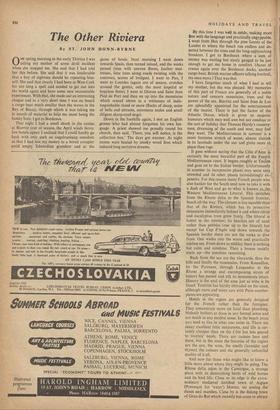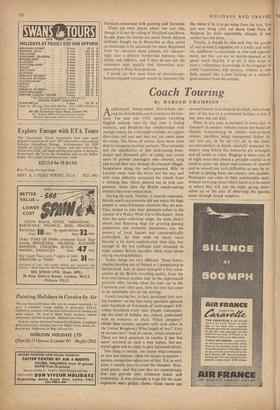The Other Riviera
By ST. JOHN DONN-BYRNL
0 NE spring morning in the early Thirties I was telling my mother of some droll incident when she stopped me. She said that I had told her this before. She said that it was intolerable that a boy of eighteen should be repeating him- self. She said that clearly I had been in West Cork for too long a spell and needed to get out into the world again and have some new recountable experiences. With that, she made out an interesting cheque and in a very short time I was on board a cargo boat much smaller than the waves in the Bay of Biscay, through which it was taking me in search of material to help me cease being the family bore. I got to Bordeaux.
That night I had a small shock in the casino at Biarritz (out of season, the April winds fierce, few hotels open). I realised that I could hardly go back with only such an ungalvanising anecdote as that I had lost my money to a bored croupier amid empty Edwardian grandeur and at the game of boule. Next morning I went down towards Spain, then turned inland, and the weeks passed (inns with uneven floors, feather mat- tresses, lime trees along roads twisting with the contours, scores of bridges). I went to Pau, I went to Lourdes (again out of season, crutches around the grotto, only the most hopeful or hopeless there). I went to Oloron and Saint Jean Pied de Port and then on up into the mountains which reared above in a whiteness of indis- tinguishable cloud or snow (flocks of sheep, noise of bells and streams, enormous mules and small diligent sharp-eyed dogs).
Down in the foothills again, 1 met an English groom who had almost forgotten his own lan- guage. A priest showed me proudly round his church, then said, 'There, you will notice, is the collection box.' The days got warmer. At night rooms were heated by smoky wood fires which induced long narrative dreams.
By this time I was well in stride, making more free with the language and practically ungyppable. I went from Dax through the pine forests of the Landes to where the beach ran endless and de- serted between the trees and the long-approaching breakers. I got to Bordeaux where a sum of money was waiting but nicely gauged to be just enough to get me home in comfort. (Acres of cranes again over the Bordeaux docks, another cargo boat, British marine officers talking football, tea once more.) That was that.
I have forgotten much of what I had to tell my mother, but she was pleased. My memories of this part of France are generally of a noble nature and concern mountains, trees and the power of the sea. Biarritz and Saint Jean de Luz are splendidly appointed for the entertainment of the tourist. There is just the factor of the Atlantic Ocean, which is given to majestic humours which may well awe but not conduce to the sort of holiday that Thomas Hardy's country- men, dreaming of the south and west, may feel they want. The Mediterranean in summer is a more feminine stretch of water, almost sluttish in its lassitude under the sun and given more to pique than rage.
It goes without saying that the Cote d'Azur is certainly the most beautiful part of the French Mediterranean coast. It begins roughly at Toulon and goes on to the Italian border. Unfortunately in summer its inexpensive places may seem very crowded and its other places intimidatingly ex- pensive. For this reason many French people who also hanker for the South tend now to take it with a dash of West and go to what is known as _the Western Mediterranean Littoral. This stretches from the Rhone delta to the Spanish frontier, beach all the way. The climate is less equable th-an that of the Riviera, which has its protective mountains immediately behind it and where citrus and eucalyptus trees grow freely. The littoral is hotter in the summer; its beaches are of sand rather than pebbles (one up to the littoral) but except for Cap d'Agde and down towards the Spanish border there are not the rocks to dive from. One wades into the warm and practically tideless sea. From dawn to midday there is nothing but calm and sunshine. Then a breeze usually starts up—the sunshine remaining.
Back from the sea are the vineyards, then the hills and finally the mountains. From Roussillon, by the Pyrenees, through Languedoc to the Rhone a strange and encompassing strain of history has passed and left its monuments intact. History is the soul of the area just as wine is its blood. Tourism has hardly obtruded on the coast, although more and more cars with Paris number- plates are appearing.
Hotels in the region are generally designed for the French rather than the foreigner. They concentrate more on food than plumbing. Nobody bothers to dress in any formal sense and not much in any modest sense. In the beach areas you tend to live in what you swim in. There are many excellent little restaurants, and life is cer- tainly cheaper than on the COte but less geared to tourists' needs. There are casinos here and there, but in the main the luxuries of the region
are the sun, the wine, the smells (lavender and thyme), the colours and the generally unhurried quality of it all.
And now for those who might like to know a little more about where they might be going. The Rhone delta takes in the Camargue, a strange place with its diminishing herds of wild horses and its. bird life. Close to its edge is the extra- ordinary mediaeval fortified town of Aigues (Provençal for 'water') Mortes, set among the dunes and marshes. Close by is the fishing town of Grau du Roi which recently has come to attract
•
Parisians concerned with painting and literature.
There are even places where one can ride, though it is not the riding of Stratford-atte-Bowe. In one place the horses are small North African stallions, bought up in Marseilles as they arrive on boatloads to be auctioned for meat. Reprieved from the chevaline these animals still unknow- ingly face a delicate border-line between ride- ability and edibility, and if they do not suit the customers may quickly find themselves mas- querading as Bawl Bottrguignon.
I would say that some form of internal-com- bustion-engined transport would be necessary for
the visitor if he is to get value from the visit. You can now bring your car down from Paris to Avignon by train reasonably cheaply if you cannot face the drive.
Finally, it should be also said that the people of,an,d around Languedoc are a kindly and witty lot, indifferent to exactitude in time and appoint- ment, but they are not so tourist-exposed as to speak much English, if at all. It thus helps to have a rudimentary knowledge of the language to avoid frustrations, and anyway, without it, one finds oneself like a _man looking at a stained- glass window from the outside.











































 Previous page
Previous page